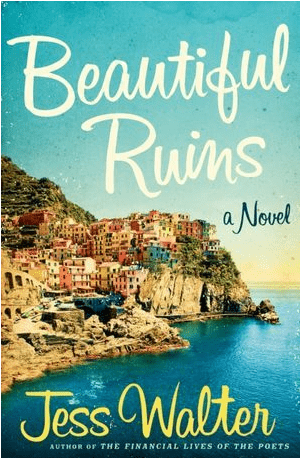
“Disjointed” is one of the words that comes to mind when I examine “Beautiful Ruins” by Jess Walter. Also, ‘confusing,’ ‘incoherent,’ ‘disorganized.’ Simply put, this book was hard to follow. It reminded me of a John Travolta movie, ‘Get Shorty’ which was a depiction of Hollywood possibly at its most true, sexist, corrupt and scandal-filled, stereotypical views of Tinsel Town at its arguably most real. However, as true or false as that premise may be, Jess Walter’s novel continues this stereotypical image of Hollywood. In a fictitious, smaller than small village on the Ligurian coast of Italy, our hero Pasquale narrates one of many stories of which this novel is composed; stories about Hollywood stars, WWII events, move sets and Italian fishing villages. Each story evolves with a basis founded on stereotypical views: Hollywood, an environment of hypocrites, selfish, greedy movie moguls struggling to retain their aura of fame after their careers have crashed on the cascading shores of declining Nielsen ratings; Italian coastal towns with cultural traditions being eroded by the new liberalism of the post war era; Hollywood stars of old clashing with the current wannabe’s over script rights, cast positioning and the self aggrandizement of a typical Hollywood star; old world cultures being displaced by modern philosophies of questionable integrity, values and principles.
The reader can never be certain as to the destination of the novel, only that it questions the validity of beliefs, philosophies and value systems of the past.

What did I dislike about the book?
I struggled to understand what I was reading, not the words, but the context of each chapter. How did it fit in with the preceding and the following chapters? What was its point? Did the chapter have a point? One could never be certain that there was a point. Each character invoked the reader’s sympathy, whether it was for their life style, or for the challenges they were facing in their lives, or for the events surrounding them now. The current chapter’s central figure could be experiencing a dangerous war time event, a declining movie career, ongoing writer’ block, the debilitation of old age, a serious illness, the dissolution of a relationship, or simply suffering depression as they live a life of loneliness. Every chapter has a central character evoking these feelings of sympathy and empathy and the emotional descent never reaches a positive resolution.
The reader simply ends up feeling sorry for whichever character is being written about in the particular chapter. The characters are not vital to Walter’s theme of ‘life is a bowl of sour cherries, so live with it;’ not even an acceptable redemption of ‘when life gives you lemons….lemonade.’ This book is lemon after lemon after lemon with the only thing being squeezed is the reader’s mind. I felt no empathy for any of the characters. I felt they were people who viewed their lives as downward spirals passively accepting the cards fate had dealt them and chosing to do nothing positive or constructive to change anything. It is a depressing book if one reads it with conviction and acceptance.

What I liked about the book?
Walter is a gifted, creative writer. Throughout the book, his narrative is interspersed with ideas, phrases and vocabulary are intellectually unique and intriguing. For example, “There are only two good outcomes for a quest like this, the hope of the serendipitous savant – sail for Asia and stumble on America – and the hope of scarecrows and tin men.” Read it repeatedly, and it still boggles the mind as to what Walters is trying to say, but give him credit for creativity. As a writer, I would be hard pressed to create phrasing as unique and as original.
Capito molto, ma non tutto.
I understood a lot but not everything. Because I have a passing knowledge of Italian, I enjoyed how the narrative had Italian interspersed throughout. It was fun to test my own capability with the language but I was thankful for Walter translating what was being said within a sentence or so to either confirm my Italian comprehension or to correct it. I am most gratified that my Italian is not totally eradicated into linguistic detritus washed up on the beach of forgotten language study.
I also enjoyed the many settings changes of the book: the Hollywood movie/TV world, the romantically rugged Cinque Terre coastline of Liguria and the plays within the novel based on script proposals offered to one of the main characters of the book. These various setting changes gave the book a changing tempo, one moment slow and almost lethargic, the next, eclectic and excited as stereotypically depicted Hollywood production settings are in the movies and on TV today. Still it made for a livelier read than any other setting might have.

Would I recommend the book?
No, I wouldn’t recommend this book to anyone, not even the loneliest, most bored, solitary inhabitant of the loneliest place in the world, an empty mind. The story may challenge with its vocabulary, its settings, its scenes, its dialogue but it bogs down in its journey to its incomprehensible and incoherent destination. I got lost as to what was happening at the end of the book…was it a dream? Was it an illusion? Was it a nostalgic reminiscence? I don’t know. What I do know is that the book is very unsatisfying as a read.





